- within Energy and Natural Resources, Tax and International Law topic(s)
- with readers working within the Media & Information and Oil & Gas industries
Turkish Competition Authority ("TCA") has published its 2022 Annual Report ("Report") where it presents an overview of its activities in the past year.
2022 proves to be a productive time for the TCA. It showcased numerous significant cases which carry a dual significance, offering insights into the TCA's potential future actions, particularly within sectors of a great importance, while also providing perspectives on the TCA's stance regarding certain types of violations. Accordingly, this productive year was concluded with a total of 342 cases. However, when compared to the numbers from 2021, there is a 16% decrease in the overall case count.
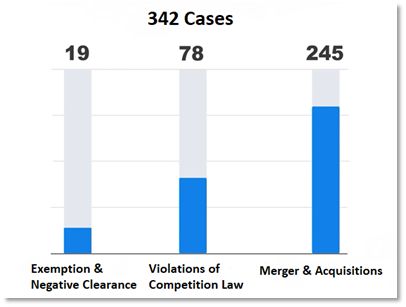
Of the cases handled, 245 pertained to mergers and acquisitions, which experienced the most significant drop among other categories. This decline can be attributed to the amendments introduced in the Merger Control Communiqué ("Communiqué"). As one might recall, upon entry into force of the amendments to the Communiqué, the turnover thresholds for notifying transactions to the TCA has been increased. The amendments have been thoroughly explained in our previous article.
Let us delve into the key figures presented in the report and proceed with our subsequent assessments.
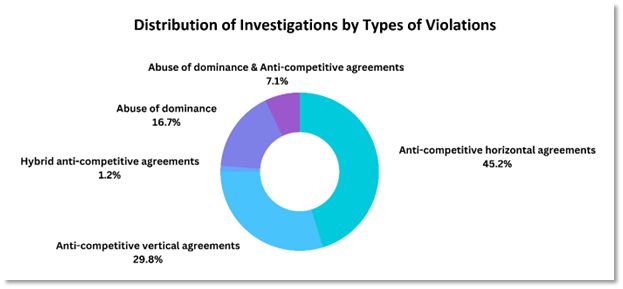
Investigations
In the past year, the TCA initiated 47 investigations, while on the other side of the spectrum, it concluded 78 cases. The allegations were predominantly revolved around violations of Article 4 (Agreements, Concerted Practices and Decisions Limiting Competition) with a notable focus on horizontal relations, as seen in previous years.
Among these 78 cases, allegations were dismissed in 20 out of the 24 preliminary examination files. Furthermore, within the 54 investigation cases, 5 resulted in commitments, and 34 cases were resolved through settlement. This highlights the effective and enthusiastic implementation of the newly established mechanisms introduced by the TCA in 2020, namely the commitment and settlement procedures.
The data highlights the top five sectors that underwent investigation (per investigation numbers) were: (i) food, (ii) health services, (iii) machinery, (iv) logistics, warehouse, and postal services, and (v) automotive. Accordingly, a total administrative fine of TRY 1.73 billion (approx. EUR 60 million) was imposed on parties under investigation. The distribution of administrative fines across industries paints a turbulent picture of sectors that might require closer monitoring.
On the other hand, the food industry faced the highest penalties, followed closely by the IT and platform services sectors, as well as the agricultural products sector with the following rates:
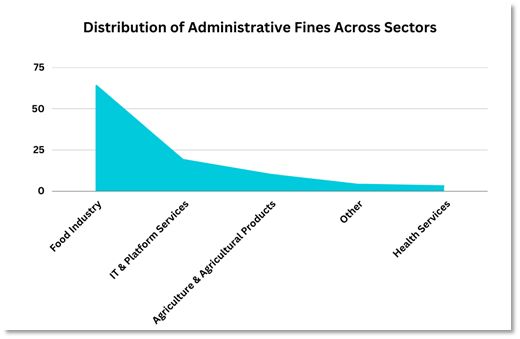
Considering Turkey's significant inflation, the firm approach of the TCA towards the food industry displays the efforts to safeguard consumers from rising costs of living. The TCA's firm approach to inflation and its detrimental impact on consumers was also highlighted by Birol Küle, the president of the TCA. According to Küle, instances of competition infringements due to common business practices especially in the FMCG sector result in limited pricing freedom for companies and, accordingly, inflated market prices, directly harming consumers and indirectly impacting the national economy1.
Besides, with regards to the IT and platform services, the TCA not only addresses instances of competition violations through initiating investigations but also carries out numerous sector inquiries. One such inquiry concluded in 2022, subjecting e-marketplaces. Other ongoing inquiries pertain to online advertising and mobile ecosystems.
Aside from the IT and platform services sectors, the TCA also concluded several sector inquiries concerning financial technologies in payment services, fresh vegetables, and fruits, in 2022. Furthermore, sector inquiries regarding pharmaceutical, fuel oil, container transportation on regular lines and container port services, automotive, and the FMCG retail sector were continued during 2022.
Mergers
Among the 245 merger notifications, 209 of the notified transactions were cleared, while 34 were considered out of scope, and 2 were granted conditional clearance. Reflecting a trend from the last 5 years, the TCA tend to unconditionally clear notified mergers. However, as stated, the number notified mergers and acquisitions are in decrease, since the Communiqué increased the relevant turnover thresholds.
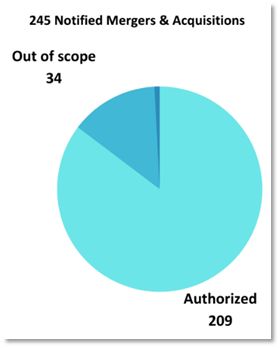
In the realm of industries, the chemical and mining sector took the lead, followed by the IT and platform services, healthcare services, banking, capital markets, finance and insurance services, infrastructure services, automotive and vehicles, logistics, warehousing and postal services, food, construction, and machinery sectors in terms of merger and acquisition decisions.
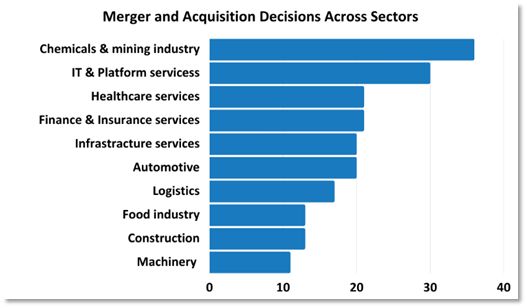
On the other hand, in March 2022, the TCA also introduced a notable amendment per the Communiqué. Accordingly, the TCA introduced an exceptional control mechanism for transactions concerning "technology undertakings". The TCA provided a definition for "technology undertakings" in the Communiqué and set forth a more inclusive turnover threshold rule for such companies.
The TCA expressly mentioned that the aim of the technology undertaking exception is to prevent "killer acquisitions" and noted that, due to the recent developments in tech markets, nascent companies that may be deemed as promising start-ups can be acquired by companies with considerable market power without being subject to a mandatory notification requirement.
In that sense, it is expected that the number of notified transactions to be increased in 2023. Also, anticipated decisions in the upcoming year 2023 are expected to provide clarity to the persistent uncertainties per the case law evolving around the introduction of this exceptional control mechanism.
TCA's Concrete Impact on the Consumer Welfare
Another noteworthy finding per the Annual Report pertains to the projected consumer benefits resulting from the TCA's decisions taken in 2022. The figures propose a significant contribution of TRY 67.32 billion (EUR 2.3 billion) annually. This illustrates the competition authorities impact on the consumer welfare.
These benefits may include a reduction in consumer detriment as a result of stopping unlawful practices, or the estimated price impact of the TCA's interventions, for example as a result of increased transparency and more informed consumer decisions.
Footnote
The content of this article is intended to provide a general guide to the subject matter. Specialist advice should be sought about your specific circumstances.

